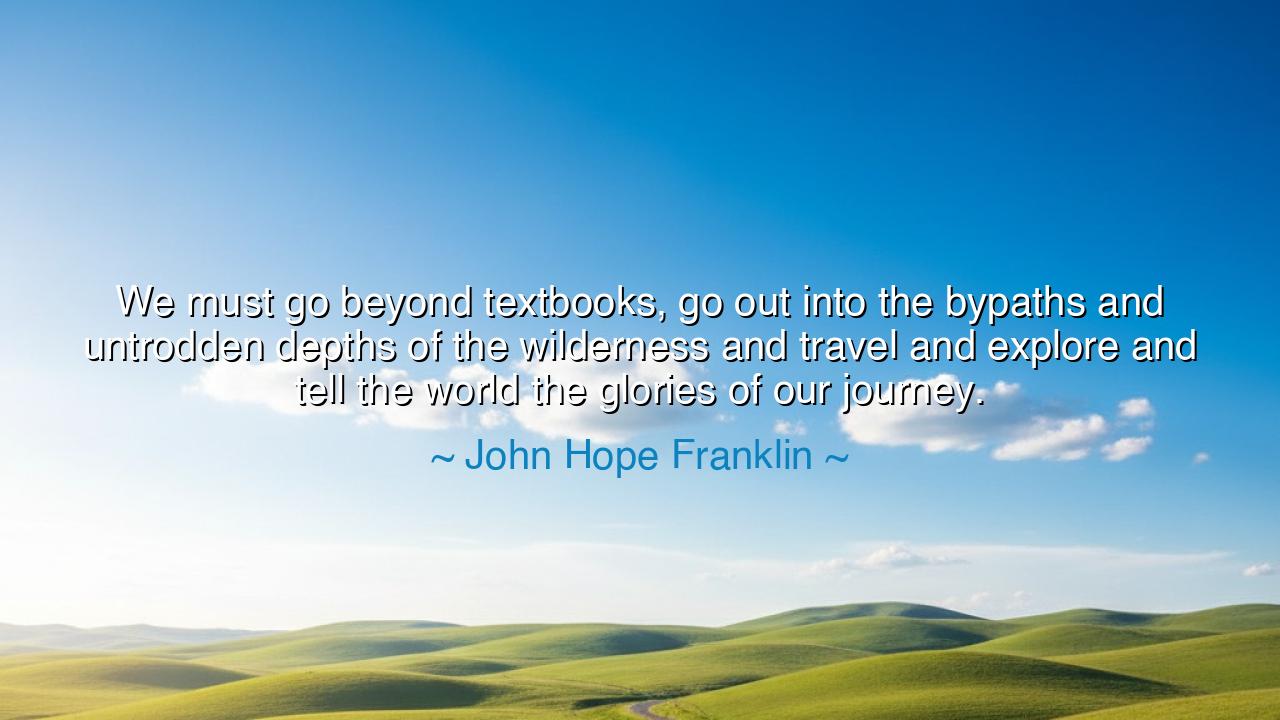
We must go beyond textbooks, go out into the bypaths and
We must go beyond textbooks, go out into the bypaths and untrodden depths of the wilderness and travel and explore and tell the world the glories of our journey.






In the words of John Hope Franklin: “We must go beyond textbooks, go out into the bypaths and untrodden depths of the wilderness and travel and explore and tell the world the glories of our journey.” These words rise not as gentle advice but as a commandment, a summons to cast off the shackles of passive knowledge and to embrace the living wisdom of experience. For Franklin, a historian of immense stature, understood that the pages of a book, though rich, are not the end of learning but its beginning. True knowledge requires the courage to walk among the unknown, to touch the soil of history, to breathe the air of discovery, and then to return and proclaim what has been found.
The origin of this quote comes from Franklin’s own life, a life that embodied both scholarship and adventure. Born into a world scarred by segregation and prejudice, he could have confined himself to the dusty halls of academia. Instead, he traveled into the heart of archives, into foreign lands, into the very pulse of the human story. His greatest works were not merely drawn from textbooks, but from the living record of people’s struggles, triumphs, and untold truths. His call to go “beyond textbooks” was not rejection of learning, but an elevation of it—learning wedded to experience, thought wedded to action.
The ancients also knew this truth. Consider Herodotus, who earned the title “Father of History.” He did not merely write what others had told him; he journeyed, he listened, he wandered into strange lands, and then he returned with tales that bore both myth and memory. Or recall Alexander the Great, who carried Aristotle’s teachings in his heart but sought to test them against the farthest horizons. Books ignite the spark, but the world feeds the flame. Franklin’s words remind us that the greatest wisdom is forged where thought and experience meet.
This quote also speaks to the soul of exploration. The “bypaths and untrodden depths of the wilderness” are not only physical landscapes but also the neglected corners of human understanding. Franklin, as an African-American historian, knew well that much of the past had been hidden, erased, or silenced. To journey into the wilderness, for him, meant to uncover those buried voices, to retrieve their glories, and to place them once more into the light of history. His words are thus both literal and symbolic: to step where others have not is to honor truth and to expand the world’s vision.
History gives us vivid examples of this calling. Think of Ibn Battuta, the Muslim traveler who wandered across Africa, Asia, and Europe for nearly thirty years. His chronicles went beyond the geography of the world; they became a mirror of its people, their customs, their hopes, and their faiths. Without his journeys, vast portions of human experience would have remained unseen. Or recall Lewis and Clark, who traveled through the wild heart of America, charting rivers and mountains, meeting tribes, and expanding the vision of a young nation. These explorers, like Franklin, answered the call to go beyond what was written, to transform knowledge into lived discovery.
The deeper meaning of Franklin’s words is that life itself is a journey of exploration. To live fully, one must resist the temptation to remain within the safe walls of what is already known. We are called to step into the wilderness of uncertainty, into the paths unlit, into the questions unanswered. And when we return, our duty is not to keep silent, but to tell the world the glories of our journey—to share what we have learned, that others may be strengthened and inspired.
The lesson for us is clear: do not let your learning end with the book. Read, yes, but then act. Study, yes, but then go forth. Travel, whether across the world or into the hidden corners of your own community. Explore new ideas, new cultures, new friendships. And when you return, speak—write, teach, create—so that the wisdom you gained is not lost but multiplied. For the world does not need knowledge locked away; it needs voices who have walked the untrodden paths and can testify to their beauty and their truth.
Thus, Franklin’s words endure as both a challenge and a promise. Go beyond textbooks. Travel. Explore. Struggle. Discover. And then, with courage and humility, tell the world of what you have seen. For it is in this cycle of learning, living, and sharing that humanity ascends—ever higher, ever wiser, ever closer to the fullness of truth.






AAdministratorAdministrator
Welcome, honored guests. Please leave a comment, we will respond soon